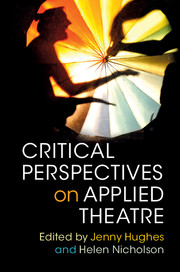Book contents
- Frontmatter
- Contents
- List of figures
- List of contributors
- 1 Applied theatre: ecology of practices
- PART I HISTORIES AND CULTURAL MEMORIES
- 2 Toward a historiography of the absent: on the late pasts of applied theatre and community performance
- 3 A pre-history of applied theatre: work, house, perform
- 4 Applied theatre and cultural memory in East and Southeast Asia
- 5 Dear Nise: method, madness and artistic occupation at a psychiatric hospital in Rio de Janeiro
- PART II PLACE, COMMUNITY AND ENVIRONMENT
- PART III POETICS AND PARTICIPATION
- Notes
- Index
- References
2 - Toward a historiography of the absent: on the late pasts of applied theatre and community performance
from PART I - HISTORIES AND CULTURAL MEMORIES
Published online by Cambridge University Press: 05 April 2016
- Frontmatter
- Contents
- List of figures
- List of contributors
- 1 Applied theatre: ecology of practices
- PART I HISTORIES AND CULTURAL MEMORIES
- 2 Toward a historiography of the absent: on the late pasts of applied theatre and community performance
- 3 A pre-history of applied theatre: work, house, perform
- 4 Applied theatre and cultural memory in East and Southeast Asia
- 5 Dear Nise: method, madness and artistic occupation at a psychiatric hospital in Rio de Janeiro
- PART II PLACE, COMMUNITY AND ENVIRONMENT
- PART III POETICS AND PARTICIPATION
- Notes
- Index
- References
Summary
Preamble
For performing theatre practice everywhere ‘history’ has become an especially tricky realm since the Earth became threatened by a likely increase of humankind reaching over ten billion individuals in the first half of the twenty-first century (Emmott 2012). In such an environment, how might any human art be ‘applied’ to the past so as to produce more hopeful futures, let alone performances conventionally conceived as always already disappearing into ephemerality? Thus in 2000, as a long-term performance practitioner, I found myself searching for multi-perspective angles on time passing under the rotting iron hull of a dry-docked nineteenth century ocean liner that, arguably, had changed the world (Kershaw 2011). I was testing how an imagined Last Mermaid Alive – encountered immediately as from the past alive in the present – might automatically instill in the bodies of spectators a resistance to what philosopher Paul Ricoeur identifies as a widely assumed ‘pathological deficiency’ of memory (2004: 21). Five years later I was in a small nineteen century urban zoo observing a pair of environmental movement artists who were dancing an improvised trio with a Latin American spider monkey (Kershaw 2012a). My research focus there was on how the attention of visitors might be stretched via such rare anthropocentric exceptions so that they might encounter a state which Italian philosopher Giorgio Agamben calls ‘bare life’ (1995: 8). Perhaps, I figured, that could be one historically temporal vector where an unendurable future might be directly engaged the better to forestall it. Might dreams be made of such stuff that makes re-visioning ‘histories’ possible through ‘applying’ performance to the pasts of the present – a rotting iron ship, ancestral cousins of Homo sapiens, and so on – so as to make some not-too-distant futures into durably hopeful times?
Introduction
Those attempts to take the past off guard, so to speak, were responding to a putative period in which postmodernism had rendered ‘history without a subject’ and ‘erased the distinction between aesthetic and political modes of expression’ (Ashley 1997: 7). Western cultures were experiencing ‘the disappearance of a sense of history … in which our entire social system has little by little begun to loose a capacity to retain its own past’ (Jameson 1985: 125).
- Type
- Chapter
- Information
- Critical Perspectives on Applied Theatre , pp. 15 - 39Publisher: Cambridge University PressPrint publication year: 2016
References
- 4
- Cited by



